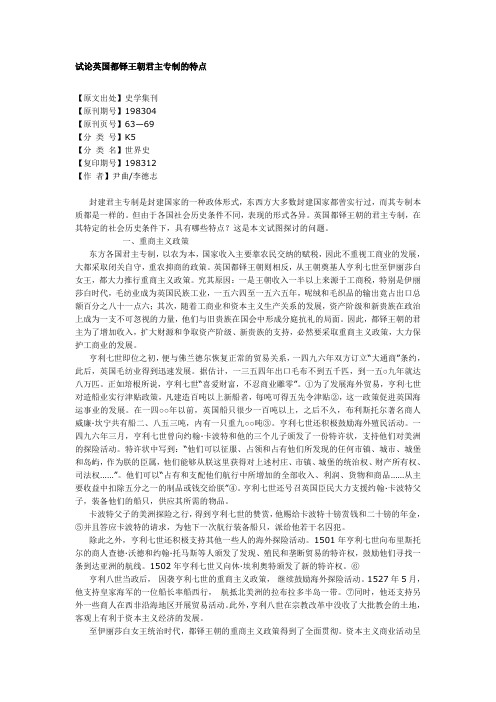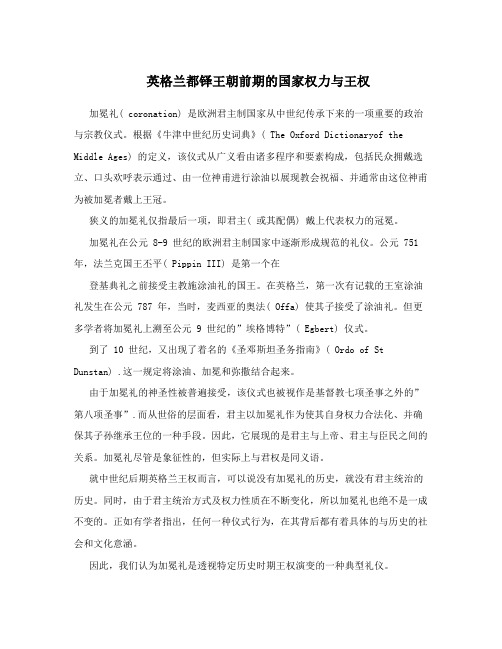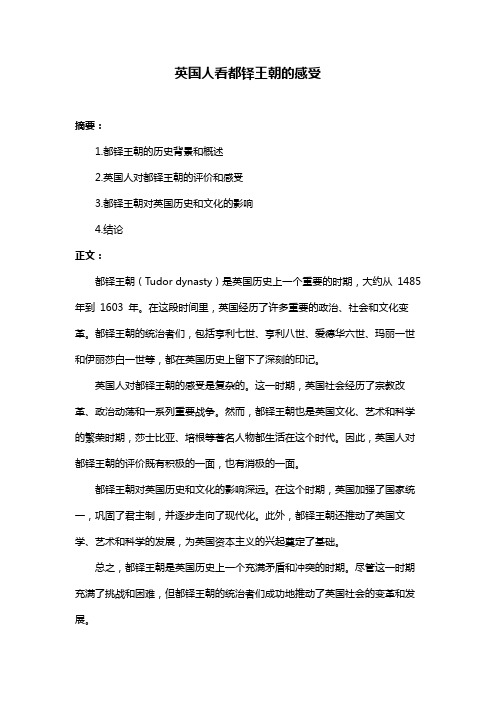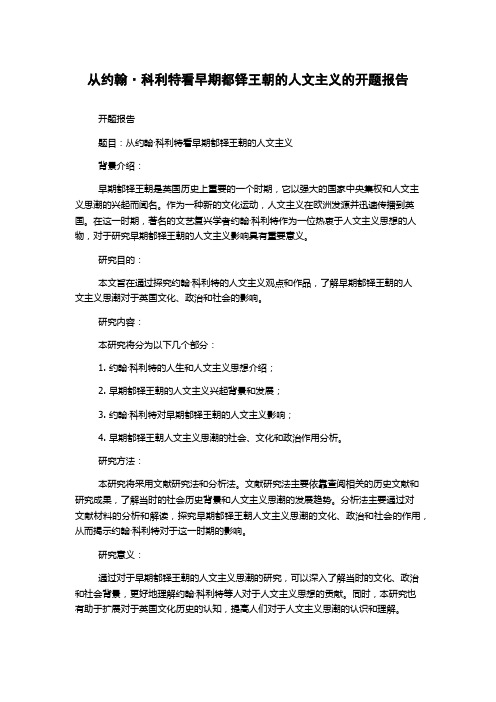英国都铎王朝论文
英国都铎王朝时期宫廷服饰的“华丽”之风及其社会意蕴

收稿日期:2017-06-11作者简介:王桂丽(1982-),女,甘肃天水人,天水师范学院文学与文化传播学院讲师。
在西方学术界,宫廷文化是欧洲近代早期史的重要研究内容。
国内一些学者也开始关注近代早期欧洲的宫廷文化,有的学者探讨了宫廷的物质文化,[1-2]还有的学者关注宫廷政治文化,[3-4]这些研究开拓了国内学界对近代早期欧洲宫廷文化的研究,加深了对近代早期欧洲王权的认识,但对近代早期欧洲宫廷文化的基本特征缺乏整体上的认识,对其社会意蕴挖掘得还不够深刻。
本文拟通过对都铎王朝时期英国宫廷服饰的系统阐述,来分析宫廷文化的“华丽”特征及其社会意蕴。
一、近代早期西欧宫廷的“华丽”之风纵观中世纪末期与近代早期欧洲宫廷文化,“华丽”(magnificence )是其基本特征之一;“华丽”对理解这一时期的宫廷文化至关重要。
约翰·弗特斯克在写于1470年的《英国的统治》一文中认为,对一位国王来说购买精美和昂贵的物品用以自娱和表现“华丽”是十分必要的;“华丽”是一项看似比他人更富有、更强大的艺术;国王要进行统治是不够的,他还要被看到正在进行统治,其手段就是以富有来展现他崇高的地位。
[5]11这种通过炫耀财富以展现权力的做法在本质是要震慑被统治者,并最终使其统治得到他们的认可。
勃艮第金羊毛骑士团的总管纪尧姆·费勒斯特在其《金羊毛》一书中认为,王公最主要的美德就是“华丽”。
[6]163他甚至引用了亚里士多德在《尼各马可伦理学》中“华丽”的概念:“华丽的人是一位鉴赏家,他懂得适度,能以高雅的品味来花费大量的金钱。
”这些钱还要花在“公共目标上而非他自己身上”。
[7]150-151华丽的王公更感兴趣于“他如何能取得最好的最恰当的效果,而非花多少钱和如何花得最少。
”[7]150王公们无论是在建筑计划中,在信仰和虔诚的表现上,还是在节庆娱乐上都不应节约,也不应考虑花费。
因此,“华丽”对纪尧姆·费勒斯特而言就是一项王公用物质上的奢华来体现其社会地位和权力的艺术。
试论英国都铎王朝君主专制的特点

试论英国都铎王朝君主专制的特点【原文出处】史学集刊【原刊期号】198304【原刊页号】63—69【分类号】K5【分类名】世界史【复印期号】198312【作者】尹曲/李德志封建君主专制是封建国家的一种政体形式,东西方大多数封建国家都曾实行过,而其专制本质都是一样的。
但由于各国社会历史条件不同,表现的形式各异。
英国都铎王朝的君主专制,在其特定的社会历史条件下,具有哪些特点?这是本文试图探讨的问题。
一、重商主义政策东方各国君主专制,以农为本,国家收入主要靠农民交纳的赋税,因此不重视工商业的发展,大都采取闭关自守,重农抑商的政策。
英国都铎王朝则相反,从王朝奠基人亨利七世至伊丽莎白女王,都大力推行重商主义政策。
究其原因:一是王朝收入一半以上来源于工商税,特别是伊丽莎白时代,毛纺业成为英国民族工业,一五六四至一五六五年,呢绒和毛织品的输出竟占出口总额百分之八十一点六;其次,随着工商业和资本主义生产关系的发展,资产阶级和新贵族在政治上成为一支不可忽视的力量,他们与旧贵族在国会中形成分庭抗礼的局面。
因此,都铎王朝的君主为了增加收入,扩大财源和争取资产阶级、新贵族的支持,必然要采取重商主义政策,大力保护工商业的发展。
亨利七世即位之初,便与佛兰德尔恢复正常的贸易关系,一四九六年双方订立“大通商”条约,此后,英国毛纺业得到迅速发展。
据估计,一三五四年出口毛布不到五千匹,到一五○九年就达八万匹。
正如培根所说,亨利七世“喜爱财富,不忍商业雕零”。
①为了发展海外贸易,亨利七世对造船业实行津贴政策,凡建造百吨以上新船者,每吨可得五先令津贴②,这一政策促进英国海运事业的发展。
在一四○○年以前,英国船只很少一百吨以上,之后不久,布利斯托尔著名商人威廉·坎宁共有船二、八五三吨,内有一只重九○○吨③。
亨利七世还积极鼓励海外殖民活动。
一四九六年三月,亨利七世曾向约翰·卡波特和他的三个儿子颁发了一份特许状,支持他们对美洲的探险活动。
英格兰都铎王朝前期的国家权力与王权

英格兰都铎王朝前期的国家权力与王权加冕礼( coronation) 是欧洲君主制国家从中世纪传承下来的一项重要的政治与宗教仪式。
根据《牛津中世纪历史词典》( The Oxford Dictionaryof the Middle Ages) 的定义,该仪式从广义看由诸多程序和要素构成,包括民众拥戴选立、口头欢呼表示通过、由一位神甫进行涂油以展现教会祝福、并通常由这位神甫为被加冕者戴上王冠。
狭义的加冕礼仅指最后一项,即君主( 或其配偶) 戴上代表权力的冠冕。
加冕礼在公元 8-9 世纪的欧洲君主制国家中逐渐形成规范的礼仪。
公元 751 年,法兰克国王丕平( Pippin III) 是第一个在登基典礼之前接受主教施涂油礼的国王。
在英格兰,第一次有记载的王室涂油礼发生在公元 787 年,当时,麦西亚的奥法( Offa) 使其子接受了涂油礼。
但更多学者将加冕礼上溯至公元 9 世纪的”埃格博特”( Egbert) 仪式。
到了 10 世纪,又出现了着名的《圣邓斯坦圣务指南》( Ordo of St Dunstan) .这一规定将涂油、加冕和弥撒结合起来。
由于加冕礼的神圣性被普遍接受,该仪式也被视作是基督教七项圣事之外的”第八项圣事”.而从世俗的层面看,君主以加冕礼作为使其自身权力合法化、并确保其子孙继承王位的一种手段。
因此,它展现的是君主与上帝、君主与臣民之间的关系。
加冕礼尽管是象征性的,但实际上与君权是同义语。
就中世纪后期英格兰王权而言,可以说没有加冕礼的历史,就没有君主统治的历史。
同时,由于君主统治方式及权力性质在不断变化,所以加冕礼也绝不是一成不变的。
正如有学者指出,任何一种仪式行为,在其背后都有着具体的与历史的社会和文化意涵。
因此,我们认为加冕礼是透视特定历史时期王权演变的一种典型礼仪。
在过去近两个世纪中,加冕礼问题受到欧美学术界持续而广泛的关注。
学者们由最初将其作为教会史组成部分略而述之,到形成一个相对稳定的研究领域,再到对加冕礼相关史料的详细考订,并有机融合了人类学、社会学等学科知识和方法,突显出该项礼仪对研究王权的价值。
英国人看都铎王朝的感受

英国人看都铎王朝的感受
摘要:
1.都铎王朝的历史背景和概述
2.英国人对都铎王朝的评价和感受
3.都铎王朝对英国历史和文化的影响
4.结论
正文:
都铎王朝(Tudor dynasty)是英国历史上一个重要的时期,大约从1485 年到1603 年。
在这段时间里,英国经历了许多重要的政治、社会和文化变革。
都铎王朝的统治者们,包括亨利七世、亨利八世、爱德华六世、玛丽一世和伊丽莎白一世等,都在英国历史上留下了深刻的印记。
英国人对都铎王朝的感受是复杂的。
这一时期,英国社会经历了宗教改革、政治动荡和一系列重要战争。
然而,都铎王朝也是英国文化、艺术和科学的繁荣时期,莎士比亚、培根等著名人物都生活在这个时代。
因此,英国人对都铎王朝的评价既有积极的一面,也有消极的一面。
都铎王朝对英国历史和文化的影响深远。
在这个时期,英国加强了国家统一,巩固了君主制,并逐步走向了现代化。
此外,都铎王朝还推动了英国文学、艺术和科学的发展,为英国资本主义的兴起奠定了基础。
总之,都铎王朝是英国历史上一个充满矛盾和冲突的时期。
尽管这一时期充满了挑战和困难,但都铎王朝的统治者们成功地推动了英国社会的变革和发展。
都铎王朝时期流民法及其对英国政治的影响

都铎王朝时期流民法及其对英国政治的影响
李景凤
【期刊名称】《重庆科技学院学报(社会科学版)》
【年(卷),期】2010(000)012
【摘要】英国都铎王朝统治时期,流民问题成为社会最为突出的问题,先后颁布了多部法令,流民问题逐步得以解决.这些法令和措施的制定并非由议会独立完成,其中很多条款也反映了国王的意志,其基本思想和原则是议会和国王共同意志的体现.对后来的英国政治产生重大影响,尤其为后来实行君主立宪制奠定坚实的基础.
【总页数】2页(P139-140)
【作者】李景凤
【作者单位】鹤岗师范高等专科学校,黑龙江,鹤岗,154107
【正文语种】中文
【中图分类】K825.1
【相关文献】
1.小管出流不同亏水时期对延后栽培葡萄耗水及品质的影响 [J], 张芮;成自勇;杨阿利;李有先;薛燕翎
2.清末川边改土归流时期巴塘“凤全事件”的起因及其影响 [J], 李何春
3.战争与英国都铎王朝时期君权的强化——以战争对财政的影响为视角 [J], 柴晨清
4.都铎王朝时期英国济贫法的发展及其影响 [J], 宫聿香
5.都铎王朝时期英国济贫法的发展及其影响 [J], 宫聿香
因版权原因,仅展示原文概要,查看原文内容请购买。
英国都铎王朝商业发展原因的历史解读

英国都铎王朝商业发展原因的历史解读
黄虎
【期刊名称】《武汉大学学报:人文科学版》
【年(卷),期】2007(60)5
【摘要】都铎王朝时期,英国商业领域发生了一系列的变革,促进了商业的迅速发展:经济条件的质变是其社会前提;上层建筑的理性化为其提供制度条件;阶级架构的转变为其提供社会基础;文化观念的转变为其提供了精神动力。
【总页数】5页(P692-696)
【关键词】都铎王朝;商业发展;原因;历史解读
【作者】黄虎
【作者单位】首都师范大学历史系
【正文语种】中文
【中图分类】K561.33
【相关文献】
1.试论英国都铎王朝时期沿海防御的特点 [J], 赵阳
2.游走在虚实之间——曼特尔“都铎王朝”系列的新历史主义解读 [J], 杨艳
3.略论英国都铎王朝的历史地位 [J], 徐飞;
4.英国都铎王朝时期民居研究 [J], 张启凡; 刘剑伟
5.论英国都铎王朝时期的地产运动及其历史意义 [J], 王晋新
因版权原因,仅展示原文概要,查看原文内容请购买。
从约翰·科利特看早期都铎王朝的人文主义的开题报告

从约翰·科利特看早期都铎王朝的人文主义的开题报告
开题报告
题目:从约翰·科利特看早期都铎王朝的人文主义
背景介绍:
早期都铎王朝是英国历史上重要的一个时期,它以强大的国家中央集权和人文主义思潮的兴起而闻名。
作为一种新的文化运动,人文主义在欧洲发源并迅速传播到英国。
在这一时期,著名的文艺复兴学者约翰·科利特作为一位热衷于人文主义思想的人物,对于研究早期都铎王朝的人文主义影响具有重要意义。
研究目的:
本文旨在通过探究约翰·科利特的人文主义观点和作品,了解早期都铎王朝的人
文主义思潮对于英国文化、政治和社会的影响。
研究内容:
本研究将分为以下几个部分:
1. 约翰·科利特的人生和人文主义思想介绍;
2. 早期都铎王朝的人文主义兴起背景和发展;
3. 约翰·科利特对早期都铎王朝的人文主义影响;
4. 早期都铎王朝人文主义思潮的社会、文化和政治作用分析。
研究方法:
本研究将采用文献研究法和分析法。
文献研究法主要依靠查阅相关的历史文献和研究成果,了解当时的社会历史背景和人文主义思潮的发展趋势。
分析法主要通过对
文献材料的分析和解读,探究早期都铎王朝人文主义思潮的文化、政治和社会的作用,从而揭示约翰·科利特对于这一时期的影响。
研究意义:
通过对于早期都铎王朝的人文主义思潮的研究,可以深入了解当时的文化、政治和社会背景,更好地理解约翰·科利特等人对于人文主义思想的贡献。
同时,本研究也有助于扩展对于英国文化历史的认知,提高人们对于人文主义思潮的认识和理解。
试论英国都铎王朝的政治状况

试论英国都铎王朝的政治状况
裴亚琴
【期刊名称】《云南大学学报(社会科学版)》
【年(卷),期】2008(007)002
【摘要】都铎王朝统治时期是英国近代宪政发展的重要时期.在此期间,强大的王权保证了强大的民族国家的形成;势力日益增长的议会是对王权的制约力量之一,并渐渐成为贵族争取自由的平台;经历了宗教改革之后的教会退出政治舞台,标志着中世纪的结束.英国宪政的各种根源在都铎王朝时期已经有了各自的基础.
【总页数】8页(P78-85)
【作者】裴亚琴
【作者单位】北京大学,北京,100871
【正文语种】中文
【中图分类】K561.33
【相关文献】
1.试论英国都铎王朝时期沿海防御的特点 [J], 赵阳
2.试论都铎王朝时期英国舰船的早期发展 [J], 杨丽丽
3.都铎王朝初期英国教育发展的新趋向 [J], 喻冰峰
4.试论都铎王朝时期英国土地占有权的变革 [J], 王晋新
5.试论英国都铎王朝君主专制的特点 [J], 尹曲;李德志
因版权原因,仅展示原文概要,查看原文内容请购买。
- 1、下载文档前请自行甄别文档内容的完整性,平台不提供额外的编辑、内容补充、找答案等附加服务。
- 2、"仅部分预览"的文档,不可在线预览部分如存在完整性等问题,可反馈申请退款(可完整预览的文档不适用该条件!)。
- 3、如文档侵犯您的权益,请联系客服反馈,我们会尽快为您处理(人工客服工作时间:9:00-18:30)。
On One of the English Dynasties—the House of Tudor Abstract: This article mainly written Tudor background, history of reform. It ismain that is in the history of King Contribution to the country. And my own view of the DynastyKey words:Tudor Dynasty; Development background; contribution During the Tudor Dynasty, the feudal production relation collapsed with the development of productive forces. Traditional military organization lost its economic basis. At that time, England had a military revolution, and the war increased military expenditure. Under the pressure of war, the Tudor monarchy required the parliamentary approval of taxes on the one hand, resulting in increased monarchy wealth, but also strengthening the control of the Parliament; on the other hand, through the confiscation of monastic property, the Tudors got rid of the political bindings of the church. The Tudor monarchy took war as an excuse, increased authority in the secular and spiritual fields by increasing revenue, and finally strengthened the throne. The year 1485 is commonly accepted today as the beginning of a new historical era. English children are commonly today that the Middle Ages ended in 1485, when the Wars of the Roses were over and the house of Tudor ascended the throne in the person of King Henry VII .The Tudor family ruled English from 1485 to 1603.It was notable state with an efficient centralized government. The Tudor Monarchy, being in the transitional stage form feudalism to capitalism, witnessed many important political, economic and social changes. It reformed church in English and tolerated enclosures. It was during the Tudor Monarchy that America was discovered and the Renaissance spread into English. The Tudor also stimulated English commercial and maritime enterprise, under them English rose commercial and maritime enterprise, under them England rose to one of its highest points of power and influence. Through the ages, the Church in Europe gathered wealth and power that attracted the jealousy of king. The rules of English, safe in their island, used the Church of the middle Ages had not a religious body, but a political and legal power. Its doctrine dominated man’s thinking in Europe and politically the pope’s interference in their national affairs, but they did nothing to weaken his rule in Rome. The reform of the political reason, The Church of the middle Ages had not been only a religious body, but also a political and legal power. Its doctrine dominated man’sthinking in Europe and politically the Church was almost an upper-state organization. The reform of religious reasons that everyone in Europe was required to belong to the same church. Anyone who held ideas different from the doctrine preached by the church would be labeled a pagan or heretic. A pagan would be put to death by the government or burnt to death by the church itself, for the church forbad bloodshed. Reform the economic reason that the church was very rich and controlled large tracts of land granted by kings or barons who want to buy open the gate to Heaven. The church enjoyed a regular tax, the title, one-tenth of the farm produce. The Pope could also raise money by selling indulgences and church posts.The Tudor period in England two things happened: a Protestant after a violent struggle to replace the Catholic religion,away from the old prison; two is the British left Shanghai on outspread road.The two things opened the British Empire step towards. Henry VIII's reform stressed the power of the monarch and certainly strengthened Henry's position; Parliament had never done such a long and important piece of work before, its importance grew as a result. His attack on the Pope's power encouraged many critics of abuses of the Catholic Church. England was moving away form Catholicism towards Protestantism. At the beginning of Tudor House, there was the Enclosure held in Britain. In the end of the 15th century the manufacture woolen cloth in England became an important source of wealth and a major export. The cloth industry increased the value of wool. Raising sheep became more profitable. This encouraged the landlords to covert arable land the omens into pastures. Later some of the nobility and merchants started to enclose the land. Large areas of land were fenced without any warning to the peasants. This process was known as Enclosure Movement. The Enclosure Movement made the essential condition for the capitalism. It made the bourgeoisie got the primitive capital accumulation. And more and more peasants without land have laid the foundation for the labor power for the capitalism. At the same time, the Tudor House put forward the mercantilism. With the help of The Enclosure Movement, the labor and the slave had regarded as a sort of commodities for the merchants to get the currency accumulation.Thus, the Tudor House had acquired the two basic qualifications for the capitalism.The Tudors family members for all Dynasties make tremendous contribution. The Tudors founder Henry VII with the York family heiress Princess Elizabeth married. He political an overtone of this marriage is quite strong is to reduce the hostile forces to obtain the throne for the purpose. In order to retain his crown, he took a series reforms In order to secure his position at home, Henry VII was anxious tohave friendly relations with foreign countries. I think that the founder of the Tudor dynasty, passed a law to improve people’s incomes, Tudor nurture, encourage the development of woolen manufacturing, export of woolen cloth in exchange for currency. Great efforts to develop overseas business, to encourage the development of the shipbuilding industry. The dynasty to promote Britain to the world..In history, we never had a royal dynasty having so many gossips like the Tudor dynasty. First, I would like to say something about Henry VIII; Henry VIII was a significant figure in the history of the English monarchy. He is popularly known for his role in the separation of the Church of England from the Roman Catholic Church. Henry was an attractive and charismatic man in his prime, educated and accomplished. He was provided with an excellent education, becoming fluent in French, Latin, and Spanish. The earliest glimpse we have of Henry comes from the pen of Erasmus, the great humanist scholar, who visited the nine year old Prince at the Palace of Eltham with Thomas More .He was provided with an excellent education, becoming fluent in French, Latin, and Spanish. The earliest glimpse we have of Henry comes from the pen of Erasmus, the great humanist scholar. It is important for knowledge to British develop. Secondly, I want to say is Britain's youngest king. He is Edward VI. He is the smallest, but also in the shortest time a king. Although Edward VI reign a very short time,but his influence on modern Britain. Edward VI is worth us to praise. Then, we will be introducing Lady Jane Grey. A Queen of England, We have to recognize his bravery. Last, about Elizabeth I. When she came to the throne not only successfully maintained the unity of England, and after nearly half a century of domination. During this period reached a peak, England to become one of the most powerful countries in Europe. She made a great contribution for the British. England rulers, the Tudor dynasty founder of the Golden Age. As Queen, she had defeated Spain’s all-powerful Armada, the British Empire is the legendary founder of the Sea, the English Reformation in calm and a firm advocate of national unity and executor, as the woman that she gives up the joy of the flesh and become a complete well-being of women.In short, The Tudor Monarchy was full of tremendous changes. All these changes were favorable to the development of capitalism, and through the changes the bourgeoisie was becoming mature politically. The day when the England bourgeoisie would take over political power was not far off. From humble beginnings in the service of the princes of Gwyneth, the Tudor family rose steadily to royal stock. Throughout the dynasty, each for the King has made a lot of contributions.。
